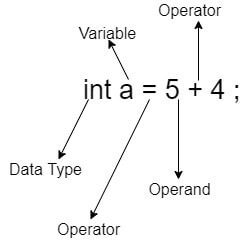What are Operators in C++? Meaning and Types
Operators are used in programming languages. They are utilized in carrying out operations on data. In the case of C++, operators are symbols that give instructions to the compiler regarding the performance of certain logical or mathematical operations. The knowledge and use of C++ operators are basic to writing clean code.
Here, we will discuss some types of operators in C++ and describe their functions, from the simple arithmetic operations to the complex ones.

Types of Operators in C/C++
Arithmetic Operator
Arithmetic operators in C++ include addition (+), subtraction (-), multiplication (*), division (/), and modulus (%). These operators are used to perform basic arithmetic operations on numerical values within C++ programs. Additionally, the increment (++) and decrement (–) operators are also available for use in C++ to conveniently modify numerical values.
Relational Operator
Relational operators are used to compare two values. They return a boolean result (true or false). This operator, denoted by symbols such as ==, !=, <, >, <=, and >=, allows programmers to compare two values or variables and evaluate their relationship. By using these operators effectively, developers can make decisions within their code based on certain conditions.
The relational operator provides various outcomes based on the comparison made between two operands. For instance, the “==” operator checks if two values are equal; if they are indeed equal, it returns a true value; otherwise, it returns false. Conversely, the “!=” operator determines whether two values are not equal to each other. Similarly, the “<” and “>” operators check if one value is less than or greater than another respectively.
Logical Operator
Logical operators are used to combine multiple conditions. They are particularly useful when you need to evaluate multiple expressions in a single statement.
For example:
&& is called as AND operator, and || is called as OR operator. These are similar to logic gates operation.
a && b returns true when both a and b are true, else false.
a || b returns true when either is true and false if both are false.
Bitwise Operator
Bitwise operators are used to perform bit-level operations on the operands. The operator first converts the operands into Bitwise level or binary representations of numbers and then performs the logical operations. & is called bitwise AND, and | is called bitwise OR. For example:
2 & 4, Here 2 is converted into a binary number as 0010 and 4 is converted into a binary number as 0100. So, 0010 & 0100 give 0
0010 | 0100 gives 0110 as the output and 6 as the number
Assignment Operator
The assignment operator is used to assign values to a variable. It is represented by ‘ = ’. For example, a = 5 + 5 ; assigns a 9 value to a variable.
‘ += ‘ or ‘-=’ are also called assignment operators. They first perform the operation and then assign the values. For example,
a += 5 is represented as “ a = a + 5”
a -= 5 is represented as “ a = a – 5”
Other Operators
There are some other operators which are also frequently used. These are basically,
Ternary Operator or Conditional Operator ( ? ): It is used to evaluate a condition like if else. For example, (conditional expression )? (option 1) : (option 2)
Option 1 is returned when a condition is true, else Option 2 is returned when the condition is false.
5 > 9 ? True : False
Answer is False
Sizeof (): Operator is used to give the operand’s size or length. It is a unary operand and takes an argument as an unsigned integral type, denoted by size_t.
For example, a sizeof(8) integer gives 4 bytes. (Depends upon OS also)
Comma Operator (,): This operator, represented by a comma symbol (,), serves multiple purposes and can be used in a variety of ways to enhance code functionality. One common use of the comma operator is as a separator, allowing multiple expressions to be evaluated within a single statement. This can help streamline code and make it more concise.
Conclusion
In C++ programming, operators help your code be effective; knowing them lets you make calculations, control logic, and work with data more efficiently. This incorporates simple arithmetic and slightly more complex bitwise operations-know how to use, what, when, and why-and your code will come out cleaner and more efficient.
And this is important for more complex applications that are written using C++. Take time to practice and experiment with each of the types of operators. Happy coding!
Also Read: What are Loops in C and C++ Programming



